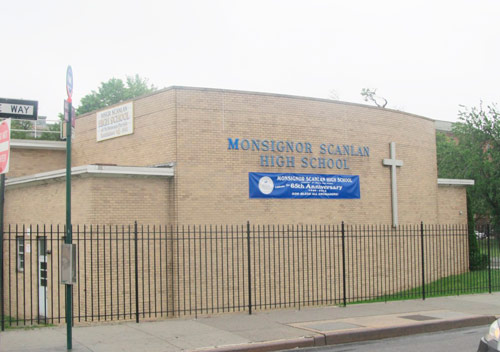Monsignor Scanlan High School’s leadership is calling on the Port Authority to have the Throggs Neck high school included in a federally-funded noise abatement program.
The Port Authority of New York and New Jersey sponsors individual schools in its School Soundproofing Program, which is mostly funded by the Federal Aviation Administration.
The money is used to retrofit buildings with soundproofing if they are in the flight paths of airports.
Nearby LaGuardia Airport in Queens creates a huge amount of noise from overhead aircraft that causes Scanlan teachers to stop their lessons, affecting the overall experience of instruction, said Peter Doran, the principal.
“It is noise pollution when you are trying to do your lesson, or if you have a SMART Board on and you are delivering some Internet lesson and you hear a plane come over,” he said. “You cannot hear; you have to stop your lesson or replay what you already have shown on the screen.”
These interruptions become problematic for teaching, and there are no set patterns to the air traffic, the principal said.
There are times during the day when it is quiet and then there are periods when the low-flying planes appear every 90 seconds, he added.
“It is not continuous for the six and a half hours, but for the time that they are coming over, it is continuous,” said Doran.
Joseph Solimine Sr., chairman of the Facilities Committee for the board of directors, supplied the Bronx Times with a letter from PANYNJ that indicates that the school qualified for the program in 1993.
Solimine explained that if a school is in the flight path, known as a contour, and the level of sound exceeds 65 decibels, then a school can qualify for funding, 80 percent of which comes from the FAA and 20 percent from the PANYNJ, which administers the program.
“We are saying that the Port Authority and FAA made a commitment…and we want them to honor that,” he said.
PANYNJ lost the records of the 1990s correspondence with the school in the World Trade Center attacks in 2001, and after reviewing the sound levels and testing the school again, determined in 2006 that the school no longer qualified for the program, documents supplied by Solimine show.
A letter to the school from PANYNJ in 2006 indicates it is no longer in the flight contour and that “noise levels from aircraft have dropped dramatically in the last few years.”
Ongoing sound metering on the school ground is continuing, he and Doran confirmed.
Solimine said based on research into the matter, he believes that Scanlan is entitled to funding for many of the buildings on its grounds, which in addition to the high school, includes a pre-k program, and in September, a charter elementary school.
“The campus is 13 acres,” he said, adding “This is an educational fortress being interrupted by airplane noise.”
If it were to qualify, Solimine, a volunteer board member, said that the school could install new ‘soundproof windows,’ as well as an upgraded heating and air-conditioning so that windows do not have to be opened when the weather is warm.
Carl Cannizzaro, owner of local firm Ensign Engineering, who is familiar with the situation at Scanlan called it a “20-year epic.”
A source at the PANYNJ confirmed that the agency believes that the Monsignor Scanlan no longer qualifies for the program.
“The high school does not meet the FAA guidelines to receive noise soundproof funding because it is not located within the current noise contour map, which includes areas with a 65 (day-night sound level) average for decibel levels,” stated a spokeswoman for the Port Authority.

























